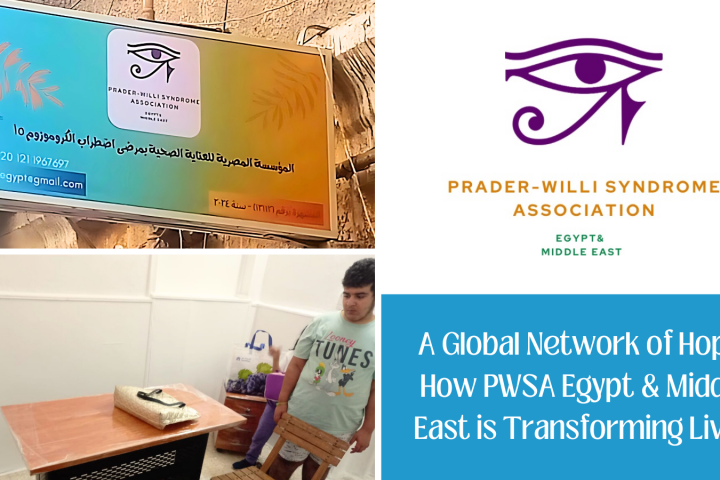PWSA | USA is excited to share the findings from a grant funding opportunity, awarded to and studied by Kasey Bedard, Ph.D., BCBA-D, IBA. This grant assisted Kasey with her work on PWS Smart-Start, a behavior-analytic caregiver training program. Kasey gives a brief overview of her results below.
------------------------------------------------------------------------------------------
Contributed by Kasey Bedard
The purpose of this grant was to develop and pilot test PWS Smart-Start. PWS Smart-Start is a behavior-analytic caregiver training program developed specifically for caregivers of children with PWS aged three to 14. PWS Smart Start is based on the principles and techniques of behavior analysis and provides parents and caregivers with knowledge, skills, and strategies to more effectively address the behavioral challenges identified by caregivers and physicians to be most detrimental to child development and wellbeing.
This multi-faceted program includes the following modules:
(1) Introduction to ABA and Behavior in PWS,
(2) Defining and Tracking Behavior,
(3) Behavioral Principles,
(4) Prevention,
(5) Reinforcement,
(6) Delayed Reinforcement Systems,
(7) Scheduling,
(8) Planned Ignoring,
(9) Functional Communication,
(10), Teaching Skills,
(11) Self-Calming Strategies for Tantrums,
(12) Food Security and
(13) Generalization and Maintenance.
Thirty-four families of children with PWS received the PWS Smart-Start training using online live video-coaching across a 10-week period. Results indicated statistically significant decreases in parental stress and burnout following the training. Additionally, significant improvements were seen in parenting practices, the quality of the parent-child relationship, and family quality of life. Statistically significant decreases were also shown across a variety of child behavioral challenges, including food seeking, tantrums, skin picking, aggression, repetitive behaviors, ritualistic behaviors, and rigidity. Most notably, parents reported that they liked the program, that it covered topics important for families of children with PWS, that it gave them new tools empowering them to better support their children, and that it lead to positive changes for their families.
These preliminary results indicate that caregiver-implemented behavior analytic interventions have the potential to not only support children with PWS through behavioral challenges, but also to reduce caregiver stress and burnout, and to improve a variety of aspects of family life.
Share this!





 Jennifer Bolander has been serving as a Special Education Specialist for PWSA (USA) since October of 2015. She is a graduate of John Carroll University and lives in Ohio with her husband Brad and daughters Kate (17), and Sophia (13) who was born with PWS.
Jennifer Bolander has been serving as a Special Education Specialist for PWSA (USA) since October of 2015. She is a graduate of John Carroll University and lives in Ohio with her husband Brad and daughters Kate (17), and Sophia (13) who was born with PWS. Perry A. Zirkel has written more than 1,500 publications on various aspects of school law, with an emphasis on legal issues in special education. He writes a regular column for NAESP’s Principal magazine and NASP’s Communiqué newsletter, and he did so previously for Phi Delta Kappan and Teaching Exceptional Children.
Perry A. Zirkel has written more than 1,500 publications on various aspects of school law, with an emphasis on legal issues in special education. He writes a regular column for NAESP’s Principal magazine and NASP’s Communiqué newsletter, and he did so previously for Phi Delta Kappan and Teaching Exceptional Children. Evan has worked with the Prader-Willi Syndrome Association (USA) since 2007 primarily as a Crisis Intervention and Family Support Counselor. Evans works with parents and schools to foster strong collaborative relationships and appropriate educational environments for students with PWS.
Evan has worked with the Prader-Willi Syndrome Association (USA) since 2007 primarily as a Crisis Intervention and Family Support Counselor. Evans works with parents and schools to foster strong collaborative relationships and appropriate educational environments for students with PWS. Dr. Amy McTighe is the PWS Program Manager and Inpatient Teacher at the Center for Prader-Willi Syndrome at the Children’s Institute of Pittsburgh. She graduated from Duquesne University receiving her Bachelor’s and Master’s degree in Education with a focus on elementary education, special education, and language arts.
Dr. Amy McTighe is the PWS Program Manager and Inpatient Teacher at the Center for Prader-Willi Syndrome at the Children’s Institute of Pittsburgh. She graduated from Duquesne University receiving her Bachelor’s and Master’s degree in Education with a focus on elementary education, special education, and language arts. Staci Zimmerman works for Prader-Willi Syndrome Association of Colorado as an Individualized Education Program (IEP) consultant. Staci collaborates with the PWS multi-disciplinary clinic at the Children’s Hospital in Denver supporting families and school districts around the United States with their child’s Individual Educational Plan.
Staci Zimmerman works for Prader-Willi Syndrome Association of Colorado as an Individualized Education Program (IEP) consultant. Staci collaborates with the PWS multi-disciplinary clinic at the Children’s Hospital in Denver supporting families and school districts around the United States with their child’s Individual Educational Plan. Founded in 2001, SDLC is a non-profit legal services organization dedicated to protecting and advancing the legal rights of people with disabilities throughout the South. It partners with the Southern Poverty Law Center, Protection and Advocacy (P&A) programs, Legal Services Corporations (LSC) and disability organizations on major, systemic disability rights issues involving the Individuals with Disabilities Education Act (IDEA), Americans with Disabilities Act (ADA), and the federal Medicaid Act. Recently in November 2014, Jim retired.
Founded in 2001, SDLC is a non-profit legal services organization dedicated to protecting and advancing the legal rights of people with disabilities throughout the South. It partners with the Southern Poverty Law Center, Protection and Advocacy (P&A) programs, Legal Services Corporations (LSC) and disability organizations on major, systemic disability rights issues involving the Individuals with Disabilities Education Act (IDEA), Americans with Disabilities Act (ADA), and the federal Medicaid Act. Recently in November 2014, Jim retired.